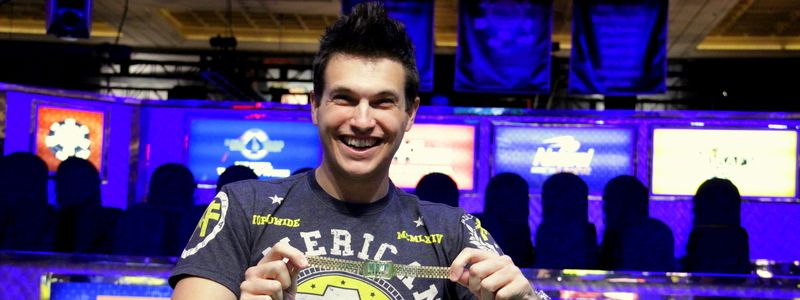
Doug Polk is one of poker’s greatest success stories over the last decade. He is a guy who talks a big story but always seems to back it up when it really matters. His rise through the stakes is a remarkable story, coming post-black Friday when the poker landscape was much tougher than what had been before.
In 2011 Polk was struggling to find success at the tables but found the motivation to push on in his quest to play Heads-up NL Hold’em at the very highest levels. Only two years later his mission was complete after beating the guy who was reputed to be the current best—Ben “Sauce123” Sulsky.
After ending a 15,000 hand match against Sulsky, Polk had racked up a cool $740,000 profit and also pocketed another $100,000 for the side bet.
What Kind of Player Is He?
We have been very fortunate to hear a lot from Doug Polk over the last few years. Active on social media, his YouTube channel history is full of content where we hear exactly how he thinks about the game.Polk comes across as what we could call a universal player. Meaning his skill set ranges from how things were done during the poker boom right up into the GTO solver era. He has been forced to work out his own strategies from the most basic principles using nothing more than a spreadsheet, but is also fully conversant in how to use the most modern tools.
As well as being a great poker technician Doug Polk proved his worth in a live tournament setting too. Three WSOP gold bracelets in four years is a great achievement that must have had many MTT specialists wondering how he made such a smooth transition from online cash games.
Polk has also racked up several appearances on TV poker shows. His often outspoken manner and ability to wind up his opponents makes for great TV.
Hand Review
This hand, while not the most technically interesting, is a great example of Doug Polk adapting to his surroundings and maximising his profit in this $25/$50 cash game on Poker Night in America.
Shaun Deeb posts the $100 straddle and millionaire businessman Avi Freedman raises to $300 with AK. Doug Polk three-bets to $1,000 with Q9. Deeb folds and Freedman calls.
The pot is $2,175 and the flop comes down JK3.
Freedman checks and Polk fires $700 with his gutshot straight draw. Freedman calls.
The turn is the 4 and Freedman checks. Polk now bets almost the full size of the pot. Freedman calls.
The river is the 10 giving Polk the second nut straight. The pot is now $10,175.
At this point in the hand nothing untowards has happened yet. Freedman has faced what looks like two standard bets, his only clues being the sizings. Polk now also has the information that Freedman doesn’t appear to have a strong hand after declining to raise on either the flop or turn.
The question is what bet size is optimal to extract the most profit.
This is where Polk excels. Avi Freedman is a rich businessman who is massively over-rolled for these stakes. Polk understands straight away that overbetting is not going to have his opponent thinking about the dollar amount.
Polk also knows that people really dislike being bluffed by him. In this case there is no real personal dynamic, as there would be in a hand against Daniel Negreanu or Phil Hellmuth, but the factor is still at play to some degree. People know that Polk loves to pull off a big bluff and they tend not to want to be his latest victim.
Taking all of this into account Polk senses that he is in a perfect setting to represent a big bluff by betting $27,000 into a pot barely more than $10,000. Freedman mulls it over for only a few seconds before calling and quickly getting the bad news.
How to Play Like Doug Polk
Learn how to study effectively: One of the reasons Doug Polk plays so well in different settings is his ability to study and get to the bottom of any strategic problem. When announcing his retirement (for the second time) he spoke about his love for “going into the lab” and working out new strategies to exploit how the majority of players were playing back in the day.This method of improvement has now been superseded at the highest levels due to the effectiveness of GTO solvers, but that doesn’t mean that ordinary players like us cannot make great gains from these older methods.
This is really how poker still works at the lower levels. Forget all this nonsense about using solvers until you’re certain your game is ready for them.
Work on adapting to unfamiliar settings: Doug Polk took his study skills and made full use of them in many different poker environments. It wasn’t that long after fighting Ben Sulsky for the title of best Heads-up NL Cash player that he was sat at the same table as Phil Ivey in a live tournament.
Specialising in one poker format is fine but it will always help to try some that are unfamiliar to help develop adaptability skills.
Use table image considerations effectively: As we saw in the hand review, Doug Polk was acutely aware of how people perceive him and uses that to his full advantage.
Summary: There are few players around today who are as well-versed in all areas of the game as Doug Polk is. A strong work ethic and refusal to ignore any part of the game that might give an edge is how one might try to play like Doug Polk.
The games are so tough today that players no longer have a choice over what “type” of player they want to be.
- Want poker news as it breaks? Join the Poker News and Gossip Telegram channel!


